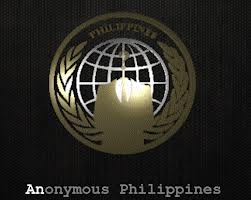‘Hacktivists’ strike again, attack Customs, ‘Eat Bulaga’ websites

Websites of the Bureau of Customs (BOC) and noon-time television show “Eat Bulaga,” were defaced Tuesday by hacker group Private X, a member of the larger hacker organization Anonymous Philippines.
Also hacked was the website of the Quezon City Police District (QCPD).
On Monday, Anonymous Philippines hit several government websites to draw attention to the oral arguments in the high tribunal.
The sites that were hit on Monday were those of the National Food Authority, National Maritime Polytechnic, Cebu Port Authority and the Municipality of Jose Panganiban (formerly Mambulao) in Camarines Norte province.
Same message
Anonymous Philippines left the same message on the BOC home page as the one on the sites defaced on Monday.
The message read: “1987 Philippine Constitution. Article III, Section 4 states that ‘NO LAW SHALL BE PASSED ABRIDGING the freedom of speech, of expression, or of the press, or of the right of the people peaceably to assemble and petition the government for redress of grievances.’”
The group added: “What happened to the law? Are all laws meant to be broken? Are they made to fool people, deprive them of their rights in exchange for what we believe as ‘Heavens for Politicians’? Some say we are against the law because it would hinder our ‘criminal activities,’ but WE do not oppose the said law in any way, if it is for the greater good.”
Online libel criminalized
The cybercrime law became controversial because it criminalizes online libel, among other things, angering journalists who have been campaigning for the decriminalization of libel.
Shortly after President Aquino signed RA 10175 into law last Sept. 12, the high tribunal suspended its implementation for four months until February after consolidating 15 petitions against it.
Black webpage
On the website of the QCPD, hacktivists put a black-themed webpage condemning the cybercrime law.
The black webpage featured the logo of Anonymous Philippines and a statement titled “Protect our Right to Freedom of Expression.”
The hacking was first noticed by the QCPD Public Information Office around
2 p.m. As of press time, the website had not been returned to normal.
Fortunately, the website (https://www.qcpdpnp.com) had no sensitive data that could compromise QCPD operations.
“The website is mostly informative in nature where the public can read about our programs, accomplishments and what numbers to call. There was no serious security breach as to the QCPD’s operations,” said Senior Supt. Joel Pagdilao, deputy district director for administration.
Less harmful
The website also did not have a feedback, comment or e-mail mechanism which Pagdilao said made Tuesday’s hacking “less harmful.”
Part of the text on the website read: “We are the voice of the weak, the sense of the numb. We are bonded by cause and purpose. We are anonymous, we are legion, we do not forgive, we do not forget. Government of the Philippines, it’s too late to expect us.”
As of press time, the QCPD was working to restore the website.
Bid for attention
Pagdilao said the hacking, timed with Tuesday’s oral arguments at the Supreme Court, was simply a “bid for attention.”
“This is the first time the QCPD website was hacked. These people have so much talent which could be put to better use than hacking websites,” he added.
As part of the procedure, the QCPD reported the hacking incident to the Anti Transnational and Cybercrime Division of the Criminal Investigation and Detection Division.
Pagdilao said the CIDG would have the capability to track down the hacker.
The Eat Bulaga website’s home page was not defaced. Instead, the site’s “About” page was replaced with a simple white screen with the phrase “u r alone.” written in plain black text. Private X claimed the hacking of the Eat Bulaga website on the hacker group’s Facebook page.
Centralize hosting of sites
Earlier this week, presidential spokesperson Edwin Lacierda said Malacañang was studying a proposal for the government to centralize the hosting of all government websites to improve security and fend off hackers.
He said “migrating” or moving all government websites to a government host would ensure safety from hackers.
“Those (websites) that are hosted by DOST (Department of Science and Technology) are secure; for instance (the) PCDSPO (Presidential Communications Development and Strategic Planning Office) and the OG (Official Gazette), they are hosted by the government and as much as the hackers have attempted to attack the OG (website), it has never been defaced,” Lacierda said.